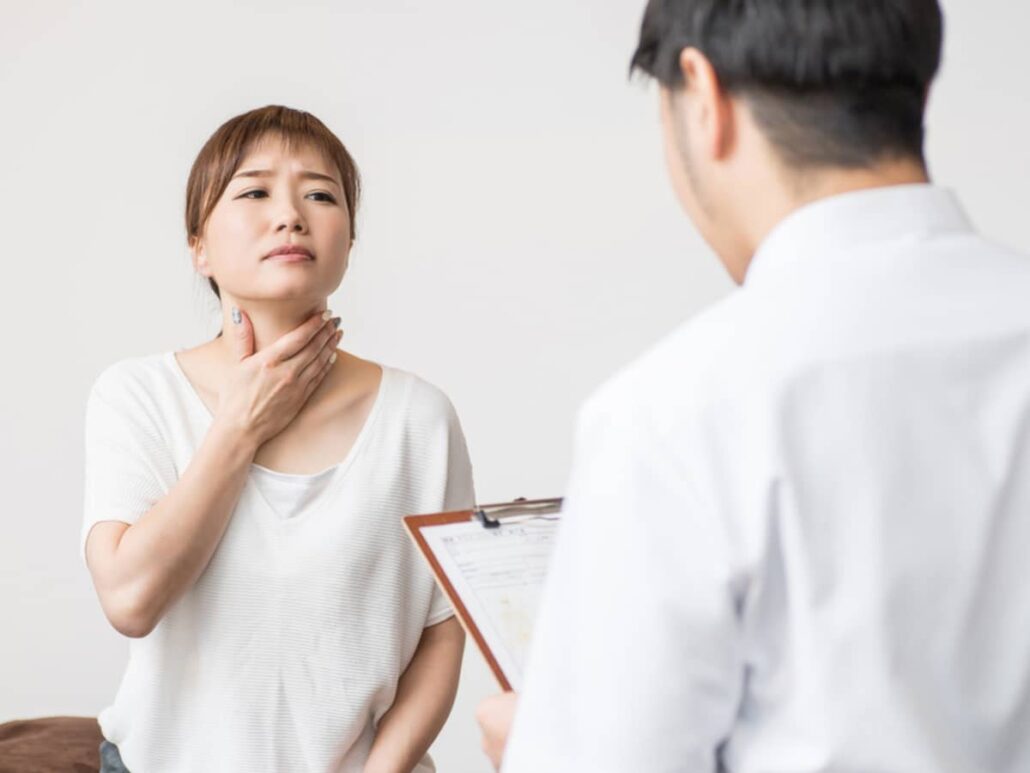
Professional Voice Disorder
Whether you are a singer, voice actor, professor, or one of the countless other professionals who rely on your voice for a living, throat and larynx problems can mean much more than just a nuisance. Unfortunately, people who use their voices in an occupational or professional capacity are more likely to experience vocal disorders. The interdisciplinary team at the Penn Medicine Becker ENT & Allergy understands that even mild voice problems can be devastating for professionals. The good news is that there are many treatments available for voice disorders, depending on the cause of the problem and your particular needs. We aim to help you through voice recovery so you can return to doing what you do best as fast and smoothly as possible.
Who are Professional Voice Users?
If you are a professional voice user (i.e. you rely on your voice for your living), even a mild voice disorder or change in your voice quality can cause you to experience big challenges in your daily life, both personally and professionally. Because of the nature of their job, professionals need to use their voices a lot on a daily basis for sustainable career success and are thus more prone to developing voice disorders.
The term “professional voice user” can include many different types of work, but some of the most common professions include singers, actors, teachers/professors, voice teachers, attorneys, clergy, telemarketers, physicians, customer service representatives, salespeople, and more. A voice disorder can cause financial and emotional hardship to professionals, such as job loss, lower income, and anxiety.
Our Voice Specialist
At Penn Medicine Becker ENT & Allergy, not only do we have a group of excellent physicians who understand your concerns, but we also have a team of highly specialized speech-language pathologists with extensive training in the particular areas of speaking voice and singing voice disorders. Our lead Speech Pathologist, for instance, Carly Schiff, has worked with and rehabilitated hundreds of professional voice users from CEOs to teachers to Broadway performers. She not only has a background in treating and rehabilitating these professionals, but she was also one herself as a previous performer and went through a vocal injury with vocal rehab.
With this specialized team, Penn Medicine Becker ENT & Allergy has the unique ability to understand the urgency and magnitude of your voice problem and the way it can and likely is impacting your daily life. Our goal is to help you through your vocal recovery as seamlessly and efficiently as possible with as little impact on you emotionally and financially.
Common Professional Voice Injuries
At Penn Medicine Becker ENT & Allergy, our team treats the different voice disorders a professional voice user suffers and helps them to have a healthy voice production.
Vocal Fold Nodules:
Vocal Fold Hemorrhage:
Vocal Fold Polyp:
Vocal Fold Scarring:
Vocal Cord Dysfunction and Vocal Cord Paralysis:
Muscle Tension Dysphonia:
Vocal Fold Cyst:
Vocal Fold Nodules are benign (non-cancerous) lesions, typically found bilaterally (on both vocal folds). Vocal Fold Nodules are most often the result of voice abuse, misuse, or overuse over an extended period of time. The repeated impact on the surface of the vocal folds often results in callous-like lesions. Nodules can vary in size greatly, from pin size to quite large.
A Vocal Fold Hemorrhage is a bleed into the superficial lamina propria of the vocal cord (the layer that gives the pliability to the vocal fold vibration). This vocal fold lesion is the result of phono trauma (stress or abuse to the surface of the vocal folds or the tiny blood vessels in the vocal cord).
Vocal Fold Polyps are benign, fluid-filled lesions that can be found unilaterally (one-sided) or bilaterally (two-sided) on the vocal cord. Polyps may appear broad-based and more blister-like (sessile) or may appear to be attached by a stalk (pedunculated). Vocal Fold Polyps are thought to be caused by trauma to the vocal folds (i.e. misuse/abuse of the voice).
Vocal Fold Scarring of the vocal cord means that the mucosa (covering of the vocal fold) is tethered to the underlying tissue and cannot vibrate freely. Vocal cord sulcus is slightly different, in that the good tissue in Reinke’s space of the vocal folds (or the superficial lamina propria) is missing (or may be filled with scar), and therefore cannot vibrate normally.
Vocal Cord Dysfunction (VCD) is a medical condition that affects the human voice. It occurs when the vocal cords, which are responsible for producing sound, do not open and close properly. This can cause difficulty in speaking or singing, hoarseness, breathiness, and other vocal issues. VCD can be caused by a variety of factors including allergies, asthma, GERD (gastroesophageal reflux disease), smoking, and even emotional stress. On the other hand, Vocal Cord Paralysis is a condition in which one or both of the vocal cords become paralyzed, resulting in difficulty in speaking and/or breathing. Vocal Fold Paralysis can cause a significant loss of voice and vocal quality. Treatment for this condition may include speech therapy, medications, surgery, or a combination of treatments depending on the severity of the condition.
Muscle Tension Dysphonia is described as dysphonia/hoarseness/voice disruption without any physiologic abnormality found in/on the vocal folds. Often, patients with MTD will report periodic pain in the sites of the larynx, neck, and other areas from the neck up. Patients with MTD may report large variability in their voice, from moments of complete normal voice to moments of aphonia (complete voice loss), but there can be patients with MTD who have more moderate dysphonia at all times. MTD can be present only in the singing voice and not in the speaking voice for some individuals.
Vocal Fold Cysts are benign (non-cancerous), fluid-filled growths that can be present congenitally (since birth) or can be acquired later in life. Cysts typically occur unilaterally on the vocal folds (one-sided), but can occur bilaterally (both sides). Cysts occur under the mucosa of the vocal fold and cause the vocal fold to be stiff in the area of the cyst.
When to Seek out Evaluation from a Voice Team (Otolaryngologist and Speech Language Pathologist)

If you are experiencing a minor voice change that has lasted for two or more weeks, you should seek out an evaluation with a multidisciplinary team, regardless of your profession. However, if you are a professional voice user and rely on your voice daily for your income and success, you should seek out an evaluation with a voice team within two days if you experience sudden changes in any of the following areas:
- Sudden onset of hoarseness, raspiness, or breathiness in the speaking and/or singing
- Abrupt changes to voice sound quality in speaking and/or singing voice (breathy, raspy, pitch breaks or cracks)
- Significant changes to your vocal range (i.e. loss of high notes, loss of low notes, loss of mid-range)
Minor voice changes may include:
- Increased warm-up time
- Straining or increased effort when talking and/or singing
- Throat pain or discomfort with speaking and/or singing
- Decreased ability to control dynamics in the singing voice
- Increased effort in specific styles of singing (i.e. belting, classical singing, etc)
- Increased vocal fatigue

Diagnosis of Voice Injuries
When it comes to the diagnosis of voice injuries, vocal professionals such as otolaryngologists and speech-language pathologists are the best people to consult. They will assess the vocal cords and other related structures to determine the cause of the problem, and once a diagnosis is made, our experts can provide medical care and treatment options that are tailored to each patient’s needs.
Treatment of Voice Disorders
Vocal hygiene includes avoiding activities that can damage the vocal cords, such as smoking, drinking alcohol, and shouting or screaming. Additionally, it is important to practice good vocal hygiene habits such as drinking plenty of water, avoiding caffeine and dairy products, and using a humidifier in dry environments.
Lee Silverman Voice Therapy
Voice therapy and neck surgery are two of the most common treatments for voice disorders. Lee Silverman Voice Therapy (LSVT) is a speech-language therapy program that focuses on improving vocal loudness, pitch, and quality. This type of therapy involves vocal exercises such as sustained phonation, breath support, and resonance exercises.
Resonant Voice Therapy
Resonant Voice Therapy (RVT) is another form of speech-language therapy that focuses on improving vocal health and quality by using techniques such as vocal warm-ups, relaxation techniques, and breathing exercises.
Both LSVT and RVT can be used in conjunction with other treatments, such as neck surgery or medication, to help improve the patient’s overall voice quality. A Speech Therapist can provide guidance on which treatment option best suits each patient’s needs.
Risk of Untreated Voice Injuries
Voice disorders can have serious consequences if left untreated. Without proper diagnosis and treatment, voice injuries can lead to permanent damage to the vocal cords, resulting in a permanently hoarse or breathy voice. Untreated voice injuries can lead to chronic pain and discomfort in the throat and neck area, as well as difficulty in speaking or singing for long periods of time. Furthermore, if left untreated, voice injuries can cause significant psychological distress due to the inability to communicate effectively with others.
Schedule an appointment with our voice experts!
If you are experiencing any voice disorder symptoms, don’t hesitate to schedule an appointment with the vocal specialists at Penn Medicine Becker ENT & Allergy Center. Our experts provide comprehensive care and treatment options tailored to each patient’s individual needs. With our expert care, we can help you get back to speaking and singing with ease. Book an appointment to start your journey toward better vocal health!
*Note: It is absolutely crucial that you seek out care from a team with experience in care for professional voice users. Not all Ear, Nose, and Throat Doctors specialize in care for professional voice users. When you get an exam of your voice, it should be a video stroboscopic examination, which is an exam performed with slow-motion imaging, recorded on a screen, and played back for you and explained in detail. If you do not receive this comprehensive care and evaluation level, you should seek a second opinion.
**Additionally, if you are a professional voice user and rely on your voice for a living, we recommend you consider getting a baseline exam. This means you come for a video stroboscopic examination when feeling 100% vocally and physically healthy. Not everyone’s vocal folds appear anatomically normal, and that is okay. When you are feeling vocally normal, we can assess the structure and function of your vocal folds and know what your baseline looks like. Therefore, if you ever encounter a symptomatic problem in the future, you will know what your baseline is to compare to and ensure no findings are incidental. You can take a video of your stroboscopic video on a phone or smart device and have it with you indefinitely.
PATIENT TESTIMONY:
“When it comes to vocal health, Carly Schiff absolutely changed the game for me. Her vast knowledge, skillful care and warm bedside manner made my post-injury healing process a breeze. Don’t even think twice, call her up and get your voice stronger than you ever thought it could be.” – Nik Walker, Aaron Burr in Hamilton An American Musical on Broadway and US Tour.

Pick one of our convenient locations
for your Professional Voice Disorder Treatment
